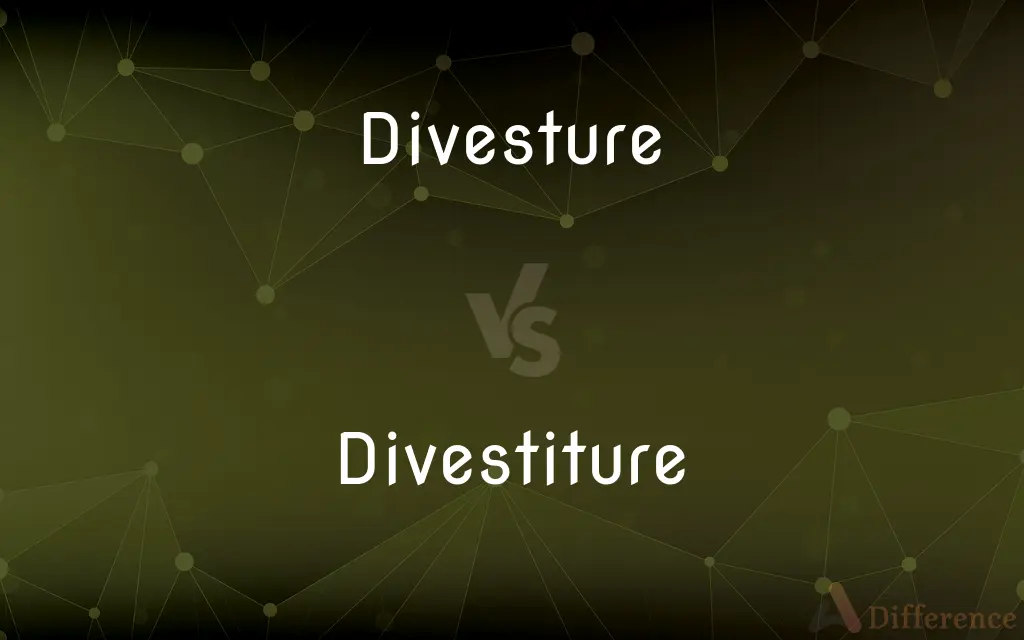Divesture vs. Divestiture — What's the Difference?
By Fiza Rafique & Maham Liaqat — Updated on March 6, 2024
Divesture and divestiture both refer to the act of selling off assets, but divestiture is more commonly used in legal and business contexts.

Difference Between Divesture and Divestiture
Table of Contents
ADVERTISEMENT
Key Differences
Divesture and divestiture are terms often used interchangeably to describe the process of a company selling off assets, subsidiaries, or investment interests. However, divestiture is the term more frequently found in legal and business documents, implying a formal process of selling off parts of a company for financial, strategic, or regulatory reasons. Divestiture, while carrying the same general meaning, is less commonly used and may be seen in more general contexts or in variation of the word usage across different English-speaking regions.
Divestiture is a term that specifically implies an organized, strategic process where a company disposes of certain assets, often as a way to focus on its core business, respond to regulatory requirements, or improve financial health. Divesture, on the other hand, can simply refer to the act of getting rid of assets or interests without implying the structured approach and strategic planning often associated with divestiture.
When companies undergo divestiture, they might sell off business units, merge them with other entities, or even close them down as part of a larger strategic plan to streamline operations or exit from non-core businesses. Divesture suggests a similar process but does not necessarily carry the same connotations of strategic restructuring or compliance with regulatory directives.
In regulatory contexts, divestiture is often used to describe the process mandated by government bodies to prevent anti-competitive practices, requiring companies to sell off parts of their business. Divesture, while it can be used in the same context, is less specific to these legal and strategic frameworks, potentially referring to any act of selling or disposing of assets.
The choice between divestiture and divestiture can also reflect the formality of the discourse or document. Divestiture is preferred in formal legal, business, and academic texts, highlighting its status as the standard term in these fields. Divesture, although understood, is less common and may appear in less formal or varied contexts.
ADVERTISEMENT
Comparison Chart
Definition
Act of selling off assets or interests
Formal process of selling off parts of a company
Usage Context
General, less common
Legal, business, strategic planning
Implication
Disposal of assets without specific strategic framework
Organized, strategic selling for financial/strategic reasons
Regulatory Context
Can be used but less specific
Often used to describe mandated sell-offs
Formality
Less formal, varied usage
Preferred in formal legal and business documents
Compare with Definitions
Divesture
General selling off without strategic implications.
Following financial difficulties, a divesture of assets was inevitable.
Divestiture
Preferred in legal/business contexts.
Regulatory approval is required for the divestiture.
Divesture
Less commonly used term.
The board discussed potential divesture options.
Divestiture
Often involves strategic restructuring.
The company announced a major divestiture to focus on core activities.
Divesture
Refers to the act of divesting.
The divesture was completed by the end of the fiscal year.
Divestiture
Formal selling of business parts.
The divestiture of the manufacturing unit was part of the strategic plan.
Divesture
May be used in various contexts.
His divesture from the project did not go unnoticed.
Divestiture
May be mandated by regulation.
The divestiture was a result of antitrust proceedings.
Divesture
Act of disposing of assets.
The company considered a divesture of its overseas divisions.
Divestiture
Emphasizes a strategic process.
The planned divestiture will streamline the company's operations.
Divestiture
The act of stripping, or depriving; the state of being divested; the deprivation, or surrender, of possession of property, rights, etc.
Divestiture
An act of divesting.
Divestiture
The act of selling something off, especially an investment or a business.
Divestiture
The sale by a company of a product line or a subsidiary or a division
Divestiture
The action or process of selling off subsidiary business interests or investments
The divestiture of state-owned assets
Divestiture
The sale, liquidation, or spinoff of a corporate division or subsidiary.
Divestiture
The process of stripping away a person's confidence, values and attitudes in order to indoctrinate them into an organization.
Divestiture
An order to an offending party to rid itself of property; it has the purpose of depriving the defendant of the gains of wrongful behavior;
The court found divestiture to be necessary in preventing a monopoly
Common Curiosities
Can divesture and divestiture be used interchangeably?
They can be, as they share similar meanings, but "divestiture" is more precise in business and legal contexts.
Why is divestiture more common in business language?
It specifically refers to the strategic and organized process of selling off company assets, fitting the formal discourse of business and legal fields.
Can divesture have the same strategic implications as divestiture?
While it can imply selling off assets, it does not inherently carry the same strategic and formal connotations as divestiture.
Can a small business undergo a divestiture?
Yes, small businesses can also undergo divestiture, though the scale and impact may differ from larger corporations.
Is regulatory approval always needed for a divestiture?
Not always, but it's required when the divestiture has potential antitrust implications or involves regulated industries.
Does divestiture always involve selling assets?
Yes, divestiture typically involves the selling of assets, subsidiaries, or business units as part of a strategic plan.
Is divestiture only used in response to regulatory requirements?
While often used in this context, divestiture can also be part of voluntary strategic business decisions.
What is the main difference between divesture and divestiture?
The main difference is usage context; "divestiture" is preferred in formal, strategic, and legal contexts, while "divesture" is less commonly used and can be more general.
How do companies decide between divesture and divestiture?
The decision often depends on the context of the discussion; divestiture is preferred for formal, strategic discussions.
How does a divestiture affect company stakeholders?
It can have various impacts, including changes in company structure, potentially affecting employees, shareholders, and strategic direction.
How long does a divestiture process take?
The duration can vary widely, depending on the complexity of the sale, regulatory approvals, and finding suitable buyers.
What makes a divestiture strategic?
It's considered strategic when it's part of a deliberate plan to improve financial health, focus on core business, or comply with regulatory mandates.
Can divesture be used in non-business contexts?
Yes, though less common, it can refer to any act of disposing of assets or interests in broader contexts.
What are the common reasons for a divestiture?
Common reasons include focusing on core business areas, raising capital, shedding underperforming units, or regulatory compliance.
Does divesture imply a loss?
Not necessarily; it's a neutral term regarding the act of selling or disposing of assets, without implying profit or loss.
Share Your Discovery

Previous Comparison
Administerial vs. Administrative
Next Comparison
Chieftain vs. ChieftessAuthor Spotlight
Written by
Fiza RafiqueFiza Rafique is a skilled content writer at AskDifference.com, where she meticulously refines and enhances written pieces. Drawing from her vast editorial expertise, Fiza ensures clarity, accuracy, and precision in every article. Passionate about language, she continually seeks to elevate the quality of content for readers worldwide.
Co-written by
Maham Liaqat














































